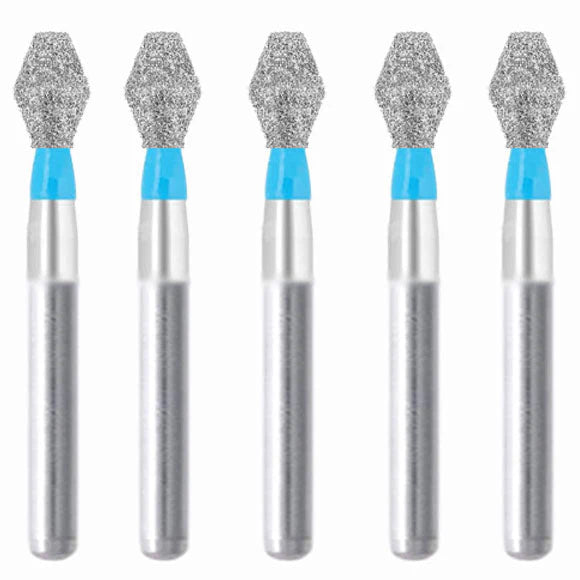Precision, Redefined: Choosing Between 3.3 mm and 3.5 mm Double Conical Diamond Burs
Posted by OSUNG Dental USA on
When you're navigating the intricacies of modern restorative dentistry, the tools you select can make or break the outcome. Among those tools, the diamond bur remains a clinician’s essential companion—especially during high-stakes crown preps or detail-critical finishing tasks. Today, we turn the spotlight on two underrated heroes: the Double Conical, Symmetrical, Short Diamond Burs in 3.3 mm and 3.5 mm diameters with medium grit.
Small Differences, Big Impact
While 0.2 mm may seem trivial, the variation between these two burs can mean the difference between access and accuracy—or speed and subtlety.
3.3 mm Bur:
- Smaller Diameter allows for tight-space maneuvering.
- Ideal for conservative preparations, especially in pediatric or lower-anterior regions.
- Offers excellent tactile control when you're shaving microns off a prep.
3.5 mm Bur:
- Slightly broader diameter enhances cutting power and surface area contact.
- Excellent for occlusal reduction or broader axial contouring.
- Best used when access is not as limited and coverage matters more than delicacy.
Double Conical & Symmetrical: Why It Works
double conical, symmetrical design ensures consistent engagement across both sides of the bur, making for uniform cutting and smooth directional changes. This reduces chatter, especially at high speeds, and helps prevent over-prepping or creating uneven margins.
Medium Grit = Goldilocks Abrasiveness
Both burs feature medium grit diamond coating, striking that ideal balance:
- Coarse enough for efficient cutting
- Fine enough to avoid creating harsh grooves or excessive surface roughness
In restorative workflows, these burs shine during:
- Crown and bridge preparations
- Contouring ceramics
- Adjusting zirconia or metal prosthetics
- Final shaping of composite restorations
Durability and Workflow Compatibility
Manufactured with a stainless steel base and coated in high-quality diamond particles, these burs are:
- Autoclavable
- Corrosion-resistant
- Compatible with FG high-speed handpieces
Their robust construction means fewer replacements and more predictable outcomes—saving both chair time and budget.
Clinical Edge: How to Choose Between the Two
|
Bur Size |
Best For |
Key Advantage |
|---|---|---|
|
3.3 mm |
Finishing in tight access zones |
Precision & finesse |
|
3.5 mm |
Broader prep zones |
Efficiency & speed |
If you're dealing with a tight molar region or micro-adjustments near gingival margins, go with the 3.3 mm. If you're working across a flat occlusal plane and want to cover ground fast and cleanly, reach for the 3.5 mm.
The magic of a great prep lies not just in the dentist’s hands, but in the harmony between handpiece and instrument. The Double Conical, Symmetrical, Short Burs in 3.3 mm and 3.5 mm offer dentists nuanced control to meet today’s clinical challenges head-on.
Because sometimes, mastering the smallest detail leads to the biggest smile.
Share this post
- Tags: Bone Graft, crown preparation, Dental Equipment, Dental Examination, Dental Practice, Dental Procedures, Dental Surgery, Dental Technology, Dental Tools, DentalImplantProcedures, DentalImplants, Dentist Tools, Dentistry Equipment, Diamond Burs, Implantology, InnovativeDentalTools, Intra Oral Camera, OSUNGUSA, Periodontal Instruments, Periodontal Surgery, Professional Approach, prosthetic restoration, surgical procedures

